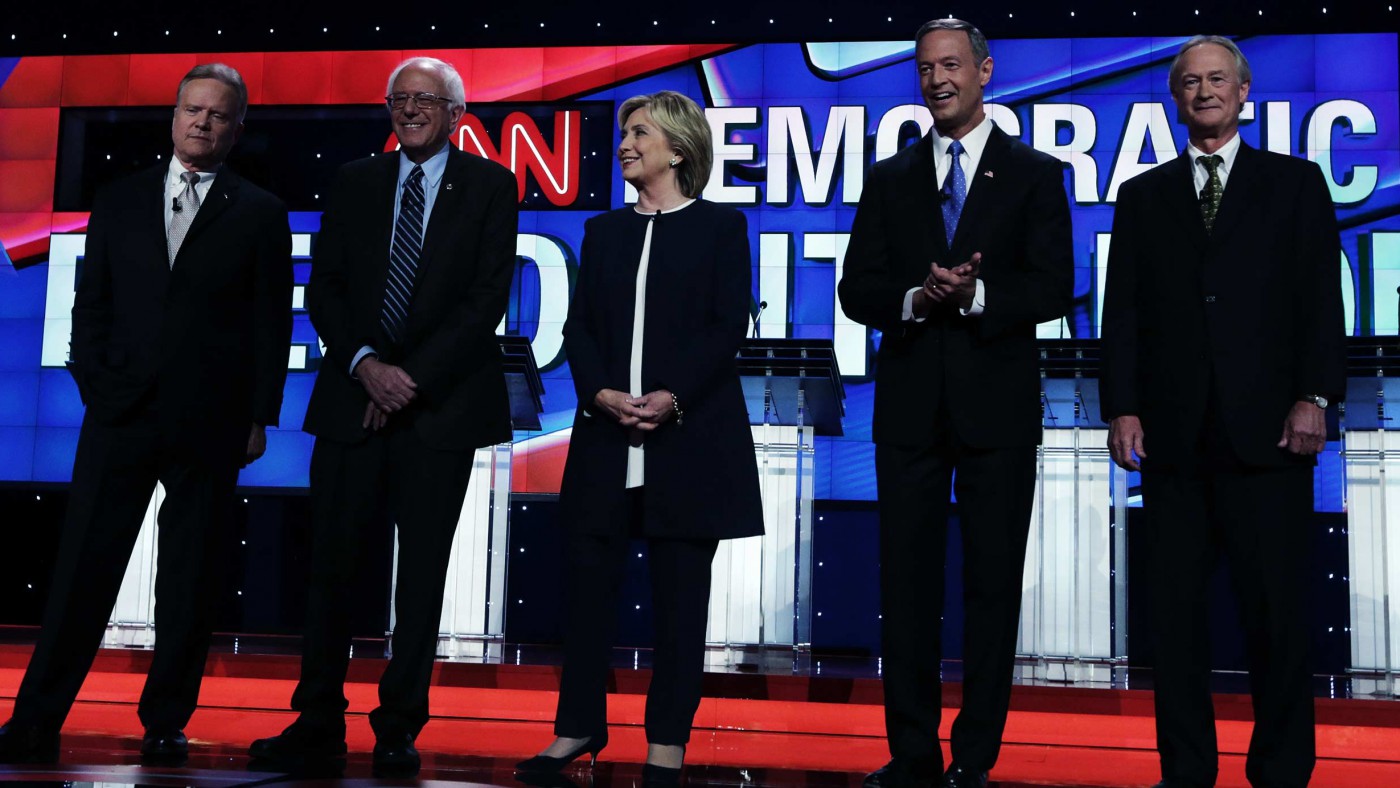The Democratic candidates for US president held their first debate of the 2016 election campaign in Las Vegas on Tuesday. After the Republican debate last month, the debate last night seemed somewhat tamer – despite a dramatic voice-over promising a night that would change the odds, it didn’t obviously shake up the candidate race.
Most commentators have agreed that front-runner Hillary Clinton was a winner, but whilst Clinton is a slick debater championing female empowerment, she was helped massively by the candidates standing on stage with her. She has Bernie Sanders to thank for coming out of the contest mostly unscathed, when he stepped in to say that Americans were tired of the controversy surrounding Clinton’s use of a private email account. Sanders’ move allowed the former secretary of state to showcase her policy positions instead of having to defend her e-mail practices. Additionally, Chafee and Webb largely sidelined themselves –seeming nervous and irritated with Webb repeatedly complaining of not being more deeply involved, a problem exacerbated by his struggle to get out a point in the time allotted to him.
For those that missed the Vegas showdown, here are five must-read articles that will get you up to speed.
- Hillary Clinton silenced her critics, Jonathan Allen, Vox
“Most important, though, Clinton did it all while reaching out to the three segments of the party that form her base: women, African Americans and Latinos. And in a party that values diversity, those appeals help bring in white men, too.”
Allen highlights that the most important aspect of Clinton’s performance in last night’s Democratic presidential debate was not whether she won but how she connected with progressive Democrats who worry whether she shares their values. Clinton’s primary rival, Bernie Sanders, has done well with white voters, but he hasn’t shown the ability to rally African Americans or Latinos to his campaign.
- Who Won the Democratic Debate? The Atlantic
The Atlantic notes that much of Hillary’s success was down to the shortcomings or general ability of the other candidates to make her look more presidential:
“Chafee and Webb seemed nervous and uncomfortable, while Sanders was—as always—Sanders: Fervent, grumpy, unfiltered, and righteously angry.”
Another good point was made at Sanders’ lack of relationship with and appeal to minorities in America, resulting in a strange alliance last night between him, the most liberal candidate on stage, and Webb, the most conservative, based on their ties to rural areas and being on the right of their party on firearms.
- Hillary Clinton is a woman who would be a female president, Alexandra Petri, The Washington Post
A tongue-in-cheek comment of Hillary’s 180 degree switch in attitude to using her gender to her advantage since her 2008 campaign:
“Just so we’re clear, once and for all: Hillary Clinton is not asking you to vote for her because of her last name, Clinton. She is asking you to vote for her because of her first name, Hillary, the name of a woman. Hillary is a woman. As such, she would be the first female president. This would be historic, because we have never elected a woman before, a woman such as Hillary, who is female.”
Whilst laying it on pretty thick, Petri does call Hillary up on her use of this one political gimmick to avoid some of the harder hitting questions revolving around how she would be different from her would-be predecessor Obama and indeed her husband.
4. The moment when Hillary Clinton won the first Democratic debate, Stephen Stromberg, The Washington Post
Offers an alternative commentary on the actual policies debated, and claims that Clinton truly won when she argued that she offers thoughtfulness and competence. He argues that the way to advance progressive goals is not to rattle off an ideologically satisfying wish-list of grandiose government programs and expect the country to suddenly fall into agreement, “it is to admit that policymaking demands a sense of nuance and of the possible”
Again this was where Sanders fell short by comparison as he “did a poor job explaining why his sledgehammer ‘democratic socialism’ is a smart or realistic response” to his correctly identified challenges the country faces.
- Hillary Clinton shines in Democratic debate, Edward Luce, Financial Times
Short, sharp piece that notes the differences between the Republican and Democrat debates and Hillary’s responses to policy questions: after the attack on her 2002 vote authorising the Iraq war, “The president clearly valued my judgement” (she was selected first secretary of state shortly afterwards). Namely, Luce points out that with the exception of Donald Trump’s live tweet commentary, “it was the first non-insult driven exchange of the 2016 presidential cycle”
A final point would be that one of the main differences between the two debates was largely because the Democratic candidates simply don’t have the same divisions that the Republicans one do, and Clinton tried to remind viewers of this unity time and again. Whenever a gulf appeared between candidates on stage, she’d mention that all of the ideas they were raising were far more progressive than anything Republicans had to offer. The passion Clinton sometimes lacks on the campaign trail was in full force Tuesday night and whilst the candidates have differences about how to achieve their goals, Hillary demonstrated that they collectively provide a formidable force against the GOP: defending paid leave, Planned Parenthood, gun regulation, reducing mass incarceration and fighting climate change and expanding access to higher education.
We leave it to Hillary to see if she can indeed get results, not just take stances.


